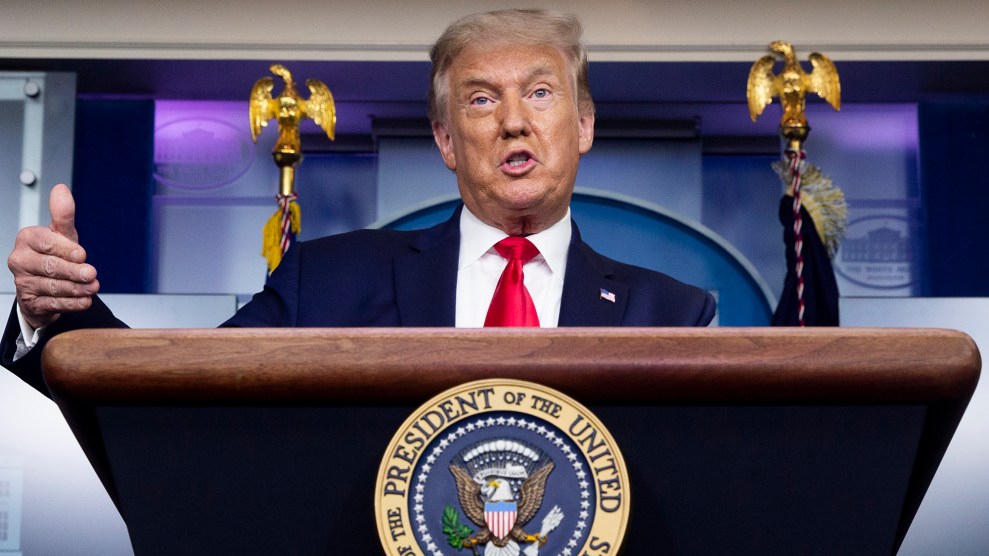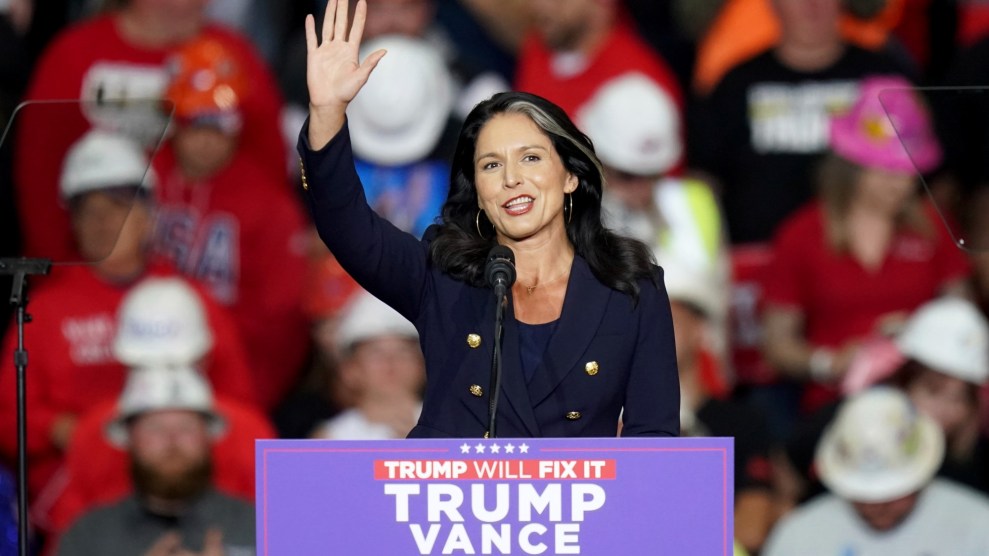
ichael Reynolds/CNP via ZUMA Wire
Last week, 11 Democratic senators signed on to a letter to Treasury Secretary Steve Mnuchin demanding the United States impose new sanctions on Russians who attempt to interfere with the 2020 election. “There is virtually no national security threat more serious,” they wrote, “than that posed by those who would undermine confidence in, and the effective operation of, our democratic elections.”
After the events of 2016, when Russian hackers attacked the Democratic National Committee and other high-profile Democratic targets, the prospect of a foreign nation again disrupting the presidential election is a real concern. (A Senate report released last month detailed renewed efforts by the Russian government to spread disinformation in order to influence the campaign.) But this year, there’s another hostile power putting its thumb on the scales to help President Donald Trump. From the United States Postal Service to the Department of Housing and Urban Development to the Justice Department, Trump has sought to use the federal bureaucracy to advance his own personal ends to a degree that’s unprecedented since the days of Richard Nixon. So far, the government that’s interfering most aggressively and overtly in the 2020 election isn’t Vladimir Putin’s—it’s Trump’s.
Presidents have long used the perks of incumbency to their advantage when campaigning, by showering special attention, for instance, on the states they need to win to secure reelection. But Trump has reoriented the mission of government itself, using the levers of power to hurt his opponents, suppress damaging information, and bolster his own campaign messaging.
The most infamous example of Trump’s use of the powers of state for electoral ends was his attempted shakedown of the Ukrainian government—for which Trump was ultimately impeached. In that case, Trump threatened to withhold military aid to coerce an allied nation to manufacture dirt on a political rival, former vice president Joe Biden. In other words, he used official diplomatic channels to bait—unsuccessfully—a foreign government into intervening in the 2020 election.
“Corrupting an election to keep oneself in office is perhaps the most abusive and destructive violation of one’s oath of office that I can imagine,” Utah Republican Mitt Romney said last year, explaining his vote to convict Trump in the Senate. Democrats warned that if Trump wasn’t taught a lesson by way of impeachment, he would simply be emboldened to keep abusing his office for political purposes.
And he has. Just a few weeks after he was acquitted in the Senate, Trump hired Richard Grenell, a longtime Republican operative who also served as ambassador to Germany, to serve as acting director of national intelligence. Grenell’s main accomplishment in that position was stoking the conspiracy Trump has dubbed “Obamagate.” Using his rarefied government perch, he selectively declassified intelligence in order to suggest that Biden had illegally spied on Trump’s campaign in 2016. It was part of an effort to turn the actual misdeeds of Trump’s inner circle into a conspiracy theory about his opponent—an electoral disinformation campaign run by the United States government
“I think you’ll go down as the all-time great ‘Acting’ ever, at any position,” Trump told him in May as Grenell exited the DNI role. Grenell promptly took a job with the Republican National Committee.
Meanwhile, Attorney General Bill Barr has suggested he might soon release the “Durham Report,” the Justice Department’s investigation into…the Justice Department’s investigation of Russia’s intervention in the 2016 election. The attorney general has made no secret about the timing.
“I’ve said there are going to be developments, significant developments, before the election,” he said in an interview on Fox News last month.
Despite public pressure from Trump, Barr has said that he doesn’t expect the Durham Report to lead to any criminal investigations of Biden or former president Barack Obama, and has lamented “increasing attempts to use the criminal justice system as a political weapon.” But in late August—in the middle of the Republican National Convention that was itself held, in part, at the White House—the Justice Department announced it was requesting more information from four Democratic governors on their handling of the Coronavirus pandemic, while “evaluating whether to initiate investigations.” They included the governors of Michigan and Pennsylvania, two swing states at the center of Trump’s re-election strategy. “This really does smell,” a former DOJ official told HuffPost.
Barr, meanwhile, has used his position as the nation’s chief law enforcement official to spread false information about voter fraud, in an attempt to influence the conduct of the election itself. On CNN, in an effort to impugn the legitimacy of mail-in voting, he invented a story about a Texas man who voted 1,700 times in one election—something his office later conceded never happened. It was a message seemingly ripped from the president’s reelection campaign.
Government interference can take the form of promoting disinformation, and it can take the form of suppressing information. On Tuesday, in a move the New York Times called “highly unusual,” the Justice Department intervened in defense of Trump in an ongoing defamation lawsuit brought by the writer E. Jean Carroll, who has alleged that Trump raped her in the 1990s. Trump denied the charge and claimed she had fabricated the story because she was “selling a new book.” The government’s official position is that when Trump said Carroll was “not my type,” he “was acting within the scope of his office or employment at the time,” according to the department’s court filing.
It’s a major assist to Trump, who was facing mounting legal bills from the case, as well as the prospect of having to provide DNA evidence and testify under oath in the coming months. As the Times put it, “The motion also effectively protects Mr. Trump from any embarrassing disclosures in the middle of his campaign for re-election.” In 2016, Trump had Michael Cohen to hush up damaging personal revelations. Now he has the DOJ.
Few nodes of the administration are immune from being co-opted for campaign purposes. Not even the Department of Housing and Urban Development, which in July undid an Obama-era rule that gave teeth to a long-unenforced provision of the Fair Housing Act. Trump made no secret of the political calculation behind the move—he was trying to set up a contrast between himself and Joe Biden, who he warned would “ABOLISH suburban communities” by letting “low-income” residents “invade” their neighborhoods.
Some synergy between policy and politics is to be expected—it’s natural that someone who violated the Fair Housing Act as a businessman would continue to undermine it as president. But HUD officials have taken an unusually active part in the fall campaign. Secretary Ben Carson spoke at the RNC, and HUD Region II Administrator Lynne Patton produced a video for the convention featuring interviews with New York City public housing residents, who criticized their Democratic mayor, Bill de Blasio, while praising their interactions with the Trump administration. The New York Times reported the next day that the residents who were interviewed did not realize they were being used as props in a partisan convention video—they thought they were cooperating with a powerful representative of a federal agency. Such is the problem: In the Trump administration, in 2020, it is impossible to tell where the government ends and the campaign begins.
The same holds true at the US Citizenship and Immigration Services, which held a citizenship ceremony at the White House during the convention as part of a stunt to soften the president’s image. (The participants reportedly were not aware that their major life event was part of the president’s re-election effort.) At the same time, the agency was poised to disenfranchise between 200,000 and 300,000 citizens-in-waiting by delaying their naturalization process. “The absence of these hundreds of thousands of ‘missing voters,’ many of whom live in swing states,” argued the Washington Post’s Catherine Rampell, “could be sufficient to sway the election.”
Rarely has the government interference been as explicit as it was in August, when Trump bragged that he was starving the United States Postal Service of bailout funds it had requested in the hopes of sabotaging mail-in balloting in the presidential election. “They need that money in order to have the post office work so it can take these millions and millions of ballots,” Trump said. “But if they don’t get those two items…that means you can’t have universal mail-in voting, because they’re not equipped to have it.” (The USPS subsequently announced that it would continue to prioritize the handling of ballots.)
Trump, after botching the government’s response to the pandemic that has killed nearly 200,000 Americans, has also tried to exploit the crisis. He has repeatedly floated the prospect of making a Covid-19 vaccine available before the election—perhaps, he said last Friday, as early as October. Thankfully public health officials, at least so far, sound more reluctant to get involved in Trump’s election schemes. Although the CDC raised eyebrows last week when it instructed states to be prepared to distribute a vaccine by November 1—two days before the election—the chief adviser for the government’s vaccine program clarified to NPR that it was “unlikely” a vaccine would be available by then, and that the memo was merely a precautionary measure.
Although Food and Drug Administration officials have insisted their vaccine approval process will not be influenced by the campaign, the Centers for Disease Control and Prevention sent a memo to states last week instructing them to be prepared to distribute a vaccine by November 1—two days before Trump’s self-imposed election deadline. The problem with a president who uses public policy for personal ends is you can never really tell when one becomes another.
Last month, Politico reported that the Department of Health and Human Services is considering spending up to $250 million on a media blitz to “defeat despair and inspire hope” on the pandemic in the coming months. While public-service announcements are hardly unusual, the spending blitz prompted a concerned letter to HHS Secretary Alex Azar from Rep. Rosa DeLauro (D-Conn.), wondering if it was “a thinly-veiled effort to use taxpayer dollars on a propaganda campaign to support the President’s reelection effort.”
And this summer Trump deployed federal law enforcement agencies and in some cases the military to American cities to suppress protests—in an attempt, once more, to reshape the narrative around which his national campaign is unfolding. That is, the notion that Americans won’t be safe in Biden’s America. On Wednesday, a whistleblower at the Department of Homeland Security alleged that top officials at the agency used their power to manipulate intelligence reports in order “to ensure they matched up with the public comments by Trump on the subject of ANTIFA and ‘anarchist’ groups”—in other words, they used federal resources to cook up justification for Trump’s campaign attacks against Biden. According to the same whistleblower, DHS was simultaneously squelching information about Russian interference because it would reflect poorly on the president. Covering up election interference is its own form of election interference.
This isn’t the first election in which Trump used government resources in an attempt to reshape the outcome. Just days before the 2018 midterms, Trump sent 5,000 troops to the US–Mexican border in a barely-concealed gambit to force Democrats on the defensive on the subject of border security and immigration. (The troops withdrew almost as soon as the votes were done being counted.)
But the 2018 ploy was a failure. And therein lies the silver lining for Democrats. Trump has demonstrated practically every day the fragility of political norms; with toothless laws like the Hatch Act, and an accommodating Senate, the separation of campaigning and governance exists more or less on the honor system. It turns out it’s incredibly easy to cynically treat the federal bureaucracy like an arm of the RNC. But when you’re doing it all in plain sight, sometimes that becomes the story.
















